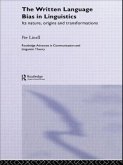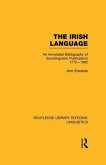This book looks at the various ways in which time is reflected in natural language. All natural languages have developed a rich repetoire of devices to express time, but linguists have tended to concentrate on tense and aspect, rather than discourse principles. Klein considers the four main ways in which language expresses time - the verbal categories of tense and aspect; inherent lexical features of the verb; and various types of temporal adverbs. Klein looks at the interaction of these four devices and suggests new or partly new treatments of these devices to express temporality.
Bitte wählen Sie Ihr Anliegen aus.
Rechnungen
Retourenschein anfordern
Bestellstatus
Storno








